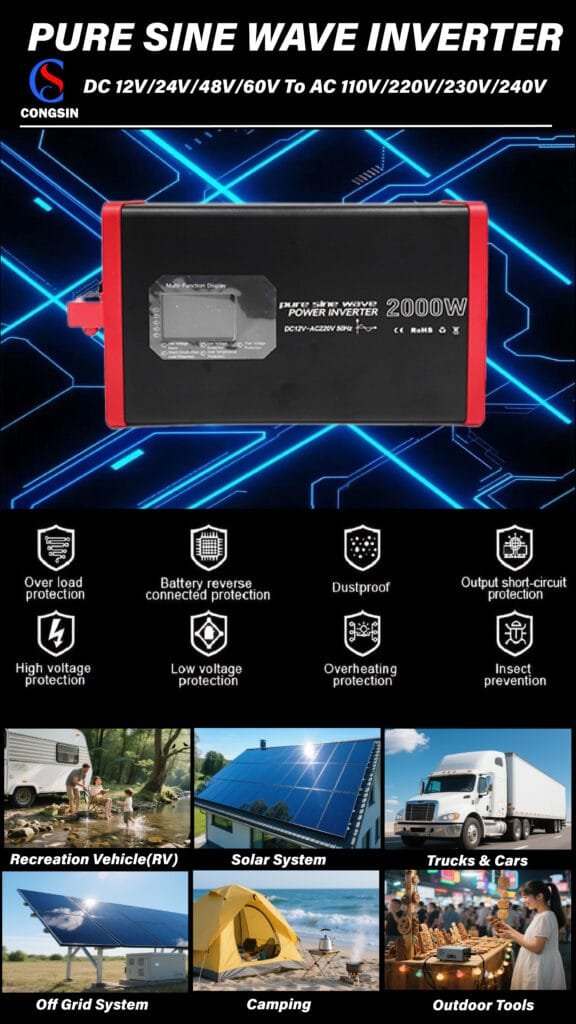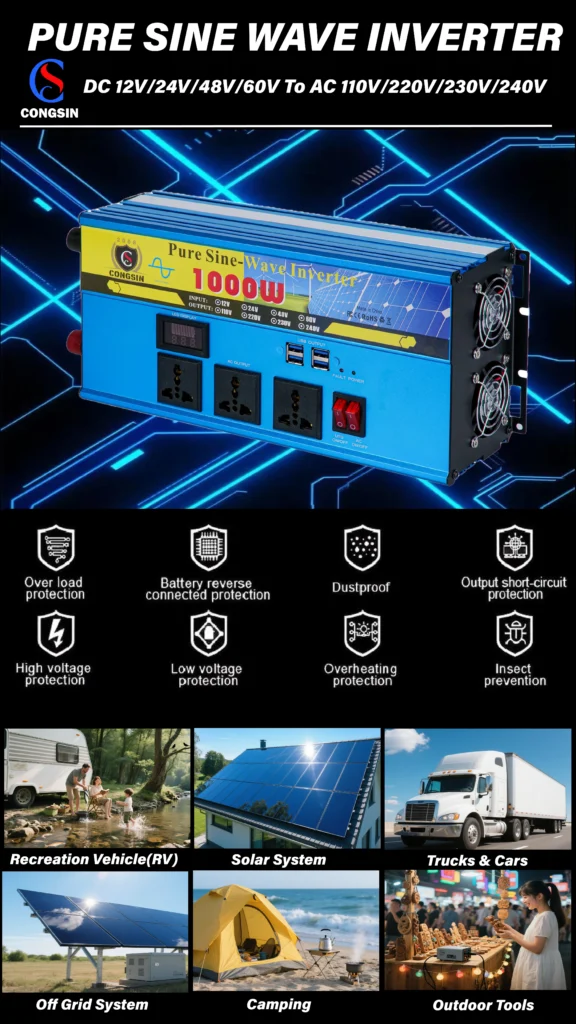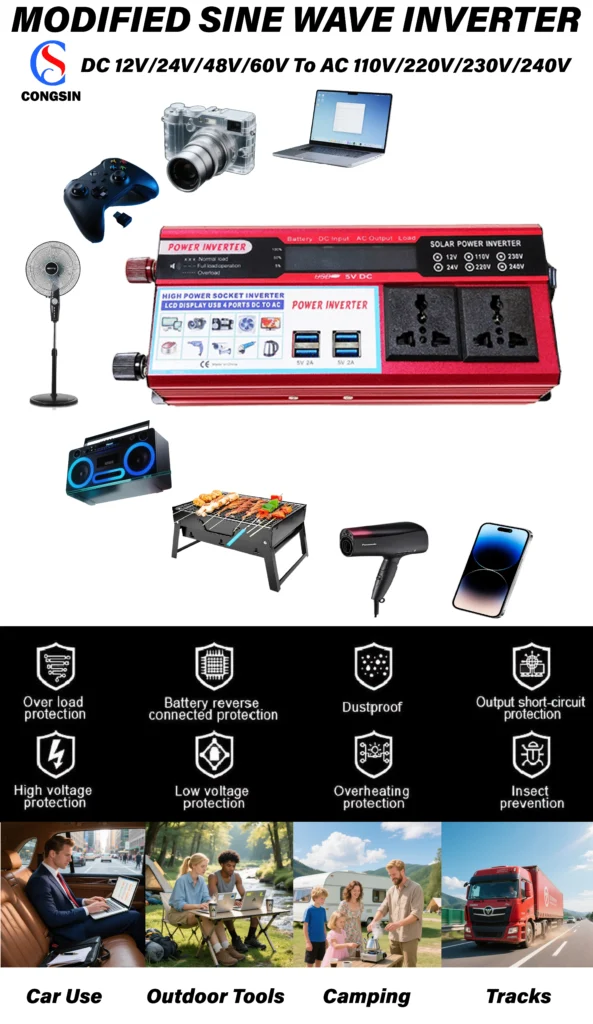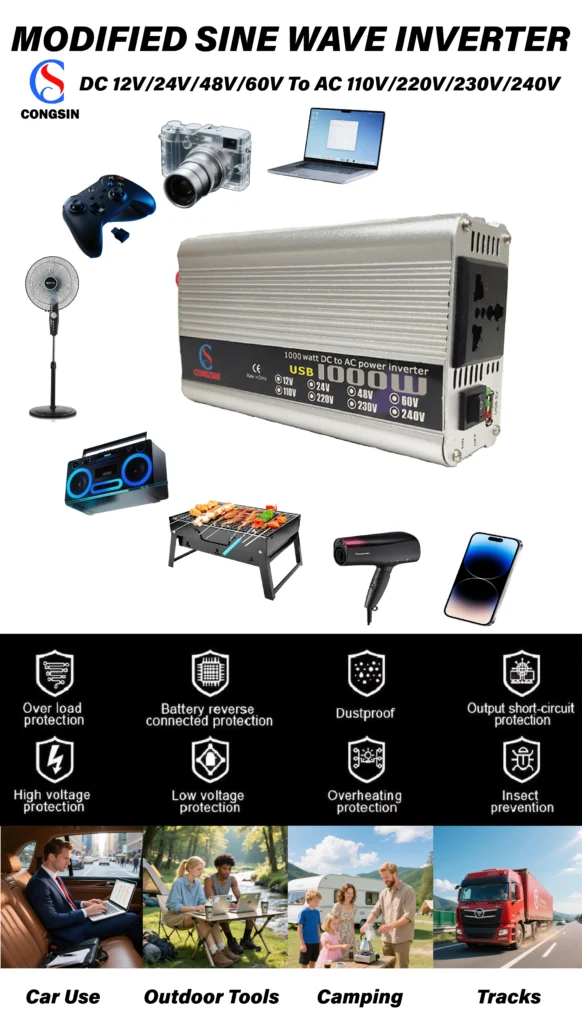Introduction:
Modern homes and businesses are increasingly dependent on power inverters to meet their energy needs. Whether you’re looking to buy a 3000W power inverter for your refrigerator and TV, or considering the best inverter manufacturer in China, this comprehensive guide will help you make the right decision.
Thank you for reading this post, don't forget to subscribe!Section 1: What Is a Power Inverter?
1.1 What Is a Power Inverter and How Does It Work?
A power inverter is a device that converts direct current (DC) into alternating current (AC), which is used by most home appliances and electronics. Inverters are vital in solar energy systems, backup power solutions, and even for household appliances like refrigerators and TVs.
1.2 Types of Inverters
- Pure Sine Wave Inverter: Provides a smooth and clean power output, making it ideal for sensitive electronics like refrigerators and computers.
- Modified Sine Wave Inverter: A more affordable option, suitable for less sensitive devices.
Section 2: How to Choose the Right Inverter for Your Needs
2.1 What to Consider When Buying a Power Inverter
- Power Requirements: Make sure the inverter can handle the wattage your appliances need. For example, a 3000W inverter is typically suitable for refrigerators and TVs.
- Inverter Efficiency: Efficiency varies among inverters. Pure sine wave inverters are generally more efficient and suitable for higher power-demand devices.
2.2 Choosing the Best 3000W Inverter
A 3000W inverter is ideal for powering household devices like refrigerators and TVs. It’s important to choose an inverter that is efficient and stable, especially for long-term use.



Section 3: The Rise of Inverter Manufacturers in China
3.1 Why Choose Inverters Made in China
China is the largest producer of power inverters globally, offering high-quality yet affordable options. Many inverter manufacturers in China provide reliable, efficient products for both home and commercial use.
3.2 Advantages of Inverter Manufacturers in China
- Cost Advantage: Chinese-made inverters are highly competitive in terms of price.
- Technological Advancements: Many Chinese manufacturers use cutting-edge technology to improve efficiency and reliability.
3.3 Recommended Chinese Inverter Manufacturer: Congsin
Congsin Solar Inverter USA is a well-known brand that focuses on providing high-quality inverters for the U.S. market. Their products stand out for their efficiency, durability, and competitive pricing, making them ideal for residential and commercial solar systems.

Section 4: Choosing the Right Inverter for Your Solar System
4.1 What Is a Solar Inverter?
A solar inverter converts the DC electricity generated by solar panels into AC power for household or business use. Choosing the right inverter is critical for system efficiency.
4.2 The Role of Lithium Batteries in Solar Systems
Integrating lithium batteries with power inverters enhances the overall performance of solar systems. Compared to traditional lead-acid batteries, lithium batteries offer longer lifespans and higher efficiency.
Section 5: Common Mistakes to Avoid When Buying a Power Inverter
5.1 Over-Saving on Cost
While cheaper inverters may seem attractive, overlooking their efficiency and reliability can lead to equipment failure and higher repair costs.
5.2 Ignoring Compatibility
Before purchasing, ensure that the inverter is fully compatible with your devices, especially high-power appliances and sensitive electronics.
Section 6: The Best 3000W Inverters on the Market
6.1 Top 3000W Power Inverters for Refrigerators and TVs
Here are some of the best 3000W inverters that are highly rated for household use:
- Congsin 3000W Pure Sine Wave Inverter: A top choice for home and small business use, especially recommended for solar energy systems.
- Renogy 3000W Pure Sine Wave Inverter: Great for off-grid activities and emergency backup.
Section 7: Why Power Inverters Are Essential for Homes and Businesses
7.1 The Importance of Power Inverters in Everyday Life
Power inverters are essential in modern homes and businesses, especially with the increasing reliance on solar energy systems. For homeowners, having a reliable inverter ensures that essential appliances like refrigerators, air conditioners, and lights run smoothly without interruptions.
In businesses, whether it’s a retail store or a small office, inverters are used for powering backup systems, ensuring that operations can continue even during power outages. With the growing trend of solar power adoption, inverters also play a crucial role in converting solar energy into usable electricity for homes and businesses.When deciding to buy power inverter units for your home, you should consider both your energy needs and the efficiency of the inverter. Choosing a high-quality power inverter can save you money in the long run.
7.2 Common Uses of Power Inverters in Homes and Commercial Spaces
- Home Use:
- Powering household appliances such as refrigerators, microwaves, and TVs.
- Solar-powered homes use inverters to convert solar energy into electricity for day-to-day needs.
- Inverters are also used in backup power systems, helping homes stay powered during grid outages.
- Business Use:
- Backup power for essential equipment like computers and security systems.
- Inverters ensure that businesses in remote areas or those reliant on solar energy have a consistent power supply.
- Large-scale solar installations use commercial inverters to manage energy output efficiently.
Section 8: How to Maintain Your Power Inverter for Longevity
8.1 Basic Inverter Maintenance Tips
Proper maintenance of your power inverter is essential to ensure it lasts and operates efficiently. Regular cleaning and maintenance can also prevent unnecessary breakdowns.
- Regularly Check the Air Vents: Inverters often run hot, so ensuring that the air vents are clean and unobstructed helps prevent overheating.
- Inspect the Cables: Check the cables for any signs of wear and tear, and ensure they are properly connected to avoid power loss.
- Temperature Control: Place the inverter in a well-ventilated area where it can operate within its optimal temperature range.
8.2 Signs of a Faulty Inverter
Here are some signs that your inverter may be malfunctioning:
- Inverter Overheating: If your inverter is continuously overheating, it could be a sign that it’s overworked or not receiving adequate ventilation.
- Inconsistent Power Supply: If your inverter fails to deliver consistent power, you might experience irregular appliance operation.
- Error Codes or Warning Lights: Many inverters have built-in diagnostics that display error codes or flashing warning lights to indicate a problem.
Conclusion
Choosing the right inverter is crucial to ensuring the safe and efficient operation of your devices. By understanding the differences between inverter types, choosing a trusted manufacturer like Congsin, and considering your power needs, you can make an informed decision that will provide reliable and cost-effective power solutions for your home or business.
Whether you are looking for a home inverter, a commercial inverter, or a solar inverter, it’s important to consider your actual needs before making a purchase. With high-quality Chinese-made inverters like those from Congsin, you can get the best value for your investment.
